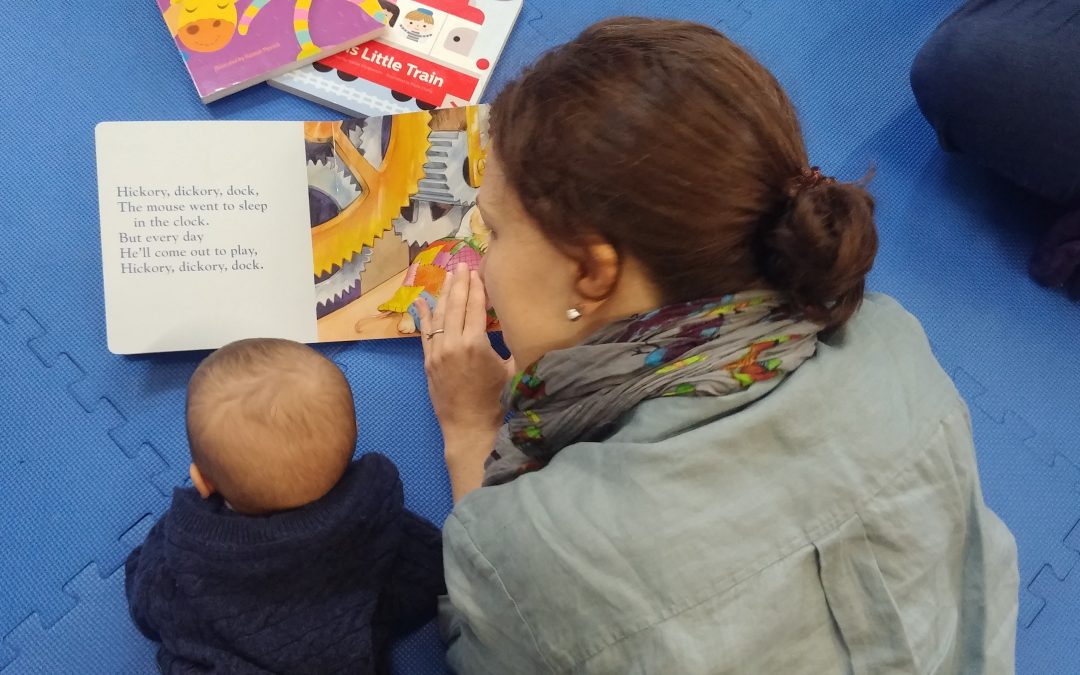Why do I need to read to my baby?
We probably all know that reading to our child is a good thing, especially when they are learning to read. However, do we really need to read to our tiny babbling babies? In short, yes! There are so many benefits of reading to your baby and, combined with musical activities, will give your child a really good boost in their early literacy skills.
Key benefits of reading to babies
Firstly, the process of reading a book can be far more than just reading the words on a page from cover to cover. Indeed, even if you just did that your child will discover:
- Inflection in your voice – no one wants to listen to a monotone reader!
- Facial expressions – have a look at yourself in the mirror when you read to see the different facial expressions you create!
- How to turn the page – we take this for granted but knowing that we read from left to right is a learned skill. Turning the pages also helps young children to develop their fine motor skills as their little hands learn to physically turn the page too.
- Special time with you – reading is a perfect time to snuggle down and bond with your baby. Add it to your daily routine so they benefit from this 1-1 time every day.
- Visual stimulation – colourful pictures will delight your little one but they will also be developing their eye muscles every time the track across the page and look at new things.
- The joy of anticipation – Every time you turn that page, it’s like a great game of peekaboo! Discover new things to see and do everytime!
However, if you add just a little extra interaction with the book, the whole experience can suddenly do so much more.
How to make reading even more exciting:
- Point out and label objects, colours and words on the page so that baby can learn to recognise them – small babies are very receptive of language and understand much more than they can initially express through speech. They are carefully listening to everything you say and making connections in their brain between the words and the world around them.
- Have fun with vocal play – vocal play is very important in a young baby’s life. Adding the sound effects of animals (“Moo”, “Baa”) or vehicles (“Vroom”, “Chug”, “Beep”) as you read, breaks sounds down into phonemes, the building blocks of spoken and written language. Babies around the 4-6 month age bracket pay less attention to your eyes when you speak but more to your mouth as they begin to work out where your voice comes from and look intently at how you make the sound!
- Allow time for conversation – Hearing proper adult conversation is vital early on as they learn to recognise that it takes two to converse and that there are pauses to allow others to respond. Ask your baby questions! Give them time to respond in their own way – this may be a look , a point, a babble. Recognise and label any response you get – “You pointed at the giraffe!”
- Read and repeat-whilst some baby books may not make for a riveting read for you, repeating them again and again make for a wonderful experience for your baby. Every time you repeat it, they become more familiar with the book, they start to make predictions about what is coming next and they will pick out their favourite bits (yes, which may mean starting from the back!). Every new activity you do with a child creates a new connection in their brain but it is through repetition that these connections are strengthened and become cemented! Repetition is essential for brain development.
All of these wonderful things can develop your baby in so many different ways but, most importantly, they will grow up knowing that reading is an enjoyable, joyful thing to do and will develop a lifelong love of reading.
Not sure what books to read? Why not check out these ideas from Kindermusik families or visit your local library.


Recent Comments